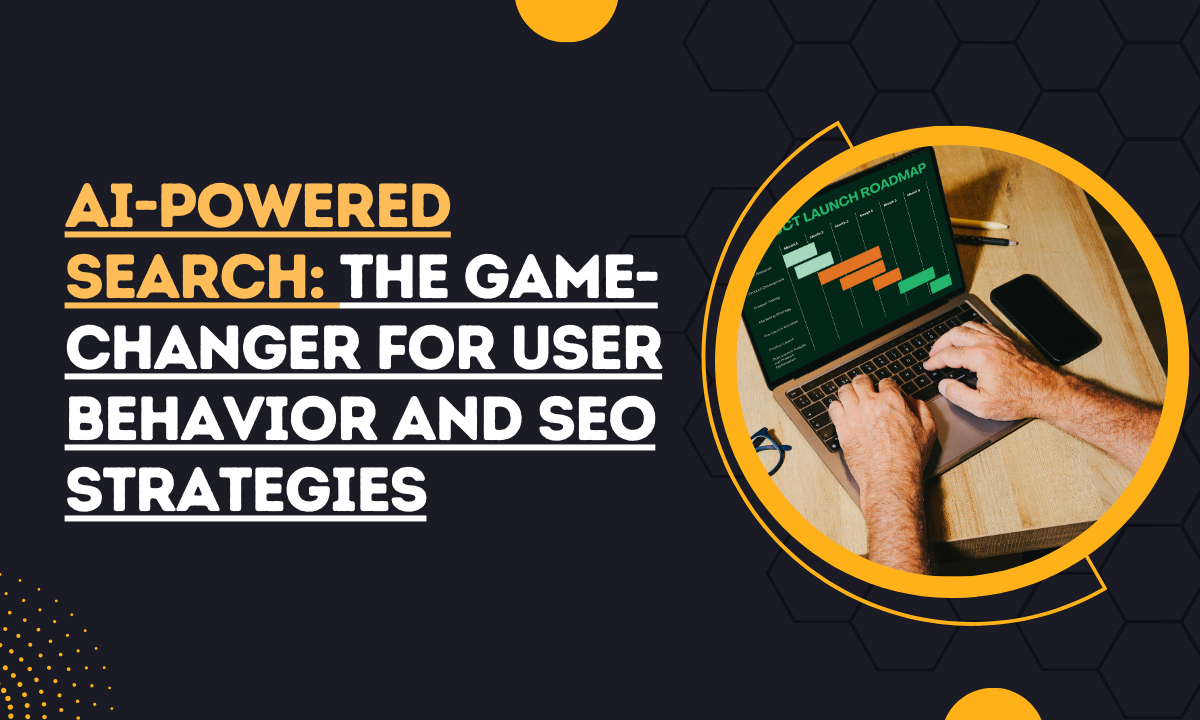AI-Powered Search: The Game-Changer for User Behavior and SEO Strategies
Will brands that ignore AI-powered search be left behind? Quite possible.
Truth be told, today generative AI is reshaping the online search environment. Because of this, traditional platforms like Google are no longer the sole resource for finding information.
What Is AI-Powered Search?
Essentially, AI-powered search uses artificial intelligence to improve how we find information online. It makes searching faster and smarter.
Due to this, searching for content has been made more helpful. That’s because search engines now learn from user behavior and improve over time.
Instead of just showing a list of links, AI-powered search understands questions better.
It also gives more accurate and personalized answers, and can even predict what you’re looking for.
Shift in User Behavior
AI-enhanced tools such as ChatGPT and Perplexity AI are quickly gaining traction, with millions of users relying on them for fast, personalized results.
This shift in user behavior is not only transforming how consumers search but also forcing businesses to rethink their digital strategies.

With AI-powered search engines delivering more relevant, high-quality content, companies must adapt. Otherwise, they risk losing visibility and market share in an increasingly competitive environment.
Statistics On Search Behaviour
Generative AI is driving a notable change in how users search for information.
Recent data shows that 79% of consumers are expected to use AI-enhanced search in the next year. Also, 70% already trust the results from these tools.
Platforms like ChatGPT and Perplexity AI are becoming popular for delivering quick, personalized answers.
ChatGPT alone gets approximately 600 million visits per month, while Perplexity AI’s search volume has reached 10 million monthly users.
This shift reflects a move away from traditional search engines like Google.
Generative AI Transforming Search Platforms
Generative AI is reshaping how people interact with search platforms. As AI tools become more sophisticated, they are changing user behavior.
This is impacting traditional search engines, and forcing businesses to rethink their digital strategies.
In order to stay competitive, companies must adapt to these evolving technologies.
Adapting to the Competitive Environment
As AI search platforms gain popularity, brands face a more competitive landscape.
AI tools prioritize high-quality, relevant content, making it crucial for businesses to meet these standards.

Image Source: 21twelveinteractive.com
The good news is that SEO and Generative Engine Optimization (GEO) share similar principles.
This means businesses already using strong SEO practices can easily incorporate GEO strategies.
Implications for Traditional Search Engines and SEO
The rise of AI-powered search has significant implications for traditional search engines and SEO.
Gartner.com predicts that by 2027, 20% of brands will differentiate their products based on the absence of AI.
In fact, mistrust and uncertainty about AI’s capabilities will lead some consumers to prefer brands and interactions that do not involve AI.
Also, by 2028, organic traffic will decrease by over 50%, as more consumers will search for generative-AI searches.
Hence, to maintain their market position, businesses must integrate GEO into their marketing strategies.
Key Strategies for Success
- Comprehensive Keyword Research: Focus on traditional search terms, long-tail keywords, and conversational phrases for AI optimization.
- Unified Content Strategy: Produce high-quality, relevant content that performs well on both traditional search engines and AI platforms. Align your content with E-E-A-T principles.
- Technical Optimization: Ensure your website loads quickly, is mobile-friendly, and uses structured data and natural language processing.
- Data-Driven Strategies: Use SEO and GEO data to refine and improve your optimization efforts continually.
FAQs
1. What is AI-powered search, and how does it work?
AI-powered search uses artificial intelligence to provide more accurate, personalized answers to user queries by understanding context and learning from user behavior.
2. How is user behavior changing with the rise of AI search platforms?
Users are increasingly trusting AI search tools for quick, relevant answers, moving away from traditional search engines like Google.
3. What impact will AI search have on traditional search engines and SEO?
AI search is predicted to reduce traditional search volume significantly, forcing businesses to adopt Generative Engine Optimization (GEO) alongside existing SEO strategies.
4. What strategies can businesses implement to adapt to AI-powered search?
Businesses should focus on comprehensive keyword research, create high-quality content, optimize their websites for technical performance, and leverage data-driven insights to enhance their strategies.
Related Posts
Maintaining Authenticity in the Age of AI: Strategies for Bloggers
Blogs Vs AI (A Raging Conflict) And The Future Of Blogging
The Role of AI and Machine Learning in Affiliate Marketing: Automation and Personalization
Future of Blogging After ChatGPT: Why Bloggers Still Matter?
Conclusion
The rise of generative AI is rapidly leading to AI-powered search. It comes as no surprise because what we’re witnessing today is simple predictions of the past. However, this is fundamentally transforming the search landscape, prompting a shift in user behavior.
Most importantly, AI-powered search is challenging traditional search engines.
As consumers increasingly trust and adopt AI-enhanced platforms, businesses must adapt by integrating Generative Engine Optimization (GEO) alongside SEO.
By embracing AI-driven search trends and focusing on high-quality, relevant content, businesses can stay competitive in this evolving digital environment.
The future of search is rapidly changing.And those who align their strategies with these AI-powered searches will be best positioned for long-term success.

